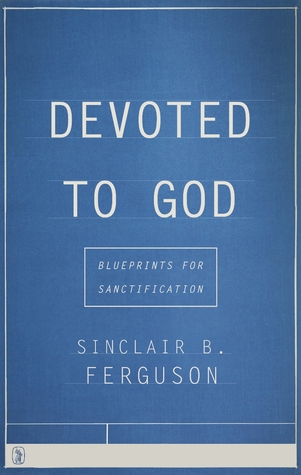First sentence: The very mention of the word 'sanctification' can send a shiver down the spine; its Anglo-Saxon equivalent, 'holiness' even more so. After all, most of us feel we have failed frequently and badly just here. But we need to begin further back than ourselves and our failures by asking two questions. The first: What does 'holiness' mean? And the second: What hope is there for me to grow in holiness and to make progress in sanctification?
Sinclair Ferguson tackles the subject of sanctification in his book Devoted to God. There are ten chapters, each covers a scripture passage on the subject.
- The Ground Plan (1 Peter 1:1-25)
- All of Me (Romans 12:1-2)
- Prepositions of Grace (Galatians 2:20)
- A Different Kind of Death (Romans 6:1-14)
- Conflict Zone (Galatians 5:16-17)
- The New Rhythm (Colossians 3:1-17)
- In for the Kill (Romans 8:13)
- The Law Goes Deep (Matthew 5:17-20)
- Keep Going (Hebrews 12:1-14)
- The Ultimate Goal (Romans 8:29)
Ferguson first defines holiness both in terms of God's holiness and our holiness. He writes, "In a sense, 'holiness' is a way of describing love. To say that 'God is love' and that 'God is holy' is to point to the same reality. Holiness is the intensity of love that flows within the very being of God, among and between each of the three persons of the Father, Son, and Holy Spirit." In other words God's holiness is the "perfectly pure devotion of each of these three persons to the other two." As for what holiness means for us, "If this is what holiness means in God, then in us it must also be a corresponding deeply personal, intense, loving devotion to him--a belonging to him that is irreversible, unconditional, without any reserve on our part. Simply put, it it means being entirely his, so that all we do and possess are his. We come to think all of our thoughts and build our lives on this foundation."
The rest of the book builds on this foundation (What does holiness mean?) examining the question "What hope is there for me to make progress in sanctification?" in light of Scripture.
Ferguson doesn't rush through Scripture, like most of us are prone to doing. He thoughtfully, carefully, precisely unpacks Scripture in an engaging, practical way. The subject is a complex one, it takes an engagement of the mind--and the heart. But just because a subject is difficult to grasp doesn't mean that we should be content with a fuzzy, vague notion of it. We should keep chewing on the Word of God--tasting and seeing that it is good--until we've got the kernel of it and can apply it to our every day lives.
The book is a substantive read. I thought Ferguson did a great job writing this one: it is well organized.
Quotes:
If God has committed himself to changing our lives, to sanctifying us, then wisdom--not to mention amazed gratitude--dictates that we should be committed to that too.
To understand rightly how baptism functions in our Christian lives we must first recognize that it points to Jesus Christ and to union with him by faith. It does not point at faith so much as summon us to faith. Christ himself, and, yes, all that faith finds in him, is the point--not primarily what we ourselves have done in coming to faith. Baptism says: "Look at what is yours in Christ," not "Look at the faith that brought you to Christ." This--the dynamic and direction of baptism's symbolism--is of fundamental importance if it is to nourish us in the lifelong way Paul believes it should.© Becky Laney of Operation Actually Read Bible


No comments:
Post a Comment